Introduction to the Importance of Regular Dental Care
Importance of Regular Dental Check-ups
Regular dental check-ups are essential for maintaining both oral and overall health. These visits help detect early signs of dental problems like cavities, gum disease, and oral cancer, allowing for timely treatment and prevention of more serious health complications. Most dental professionals recommend seeing a dentist at least once or twice a year depending on individual needs.
Connection Between Oral Health and Overall Wellness
Good oral hygiene is not only about a bright smile but also plays a significant role in overall wellness. Poor oral health has been linked to systemic conditions such as heart disease, diabetes, stroke, and pregnancy complications. Gum diseases, like periodontitis, trigger inflammation that may contribute to these conditions, underscoring the importance of maintaining healthy teeth and gums.
Family-Oriented Dental Care in Totowa
Residents of Totowa, New Jersey, benefit from several family-oriented dental practices that offer comprehensive care for patients of all ages. These clinics utilize advanced technologies like digital x-rays and provide personalized treatment plans tailored to each individual. Services range from routine exams and professional cleanings to orthodontics and cosmetic dentistry, all delivered in a comfortable, patient-focused environment. The focus on preventive care ensures healthy smiles and supports overall health for the entire family.
Comprehensive Oral Healthcare Services at Best Choice Dental
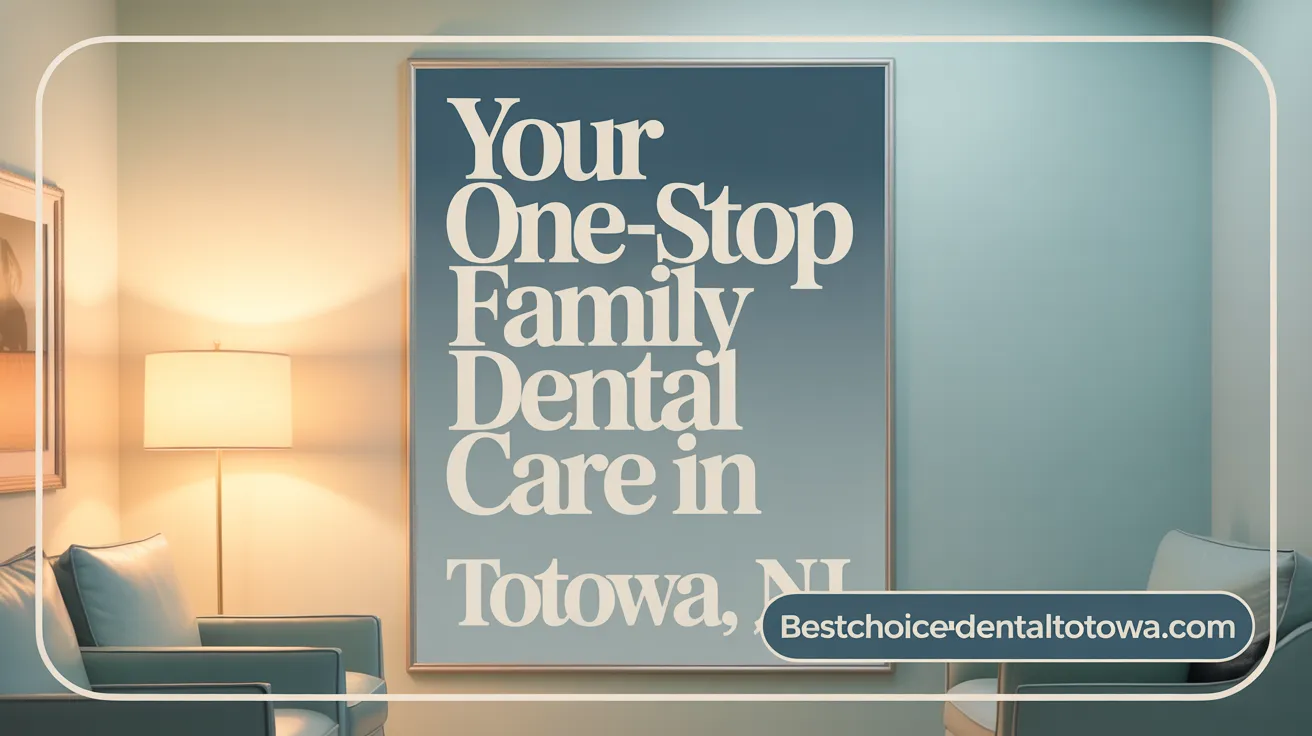
Is Best Choice Dental a family-oriented practice?
Yes, Best Choice Dental is a family-oriented practice committed to providing excellent dental care for patients of all ages in Totowa, New Jersey. The practice focuses on creating a welcoming and comfortable environment where personalized, comprehensive treatment plans cater to each individual’s unique needs. Best Choice Dental’s multilingual staff ensures that patients from diverse backgrounds feel understood and valued, enhancing communication and trust. Flexible scheduling options, along with emergency dental services, make it easier for families to prioritize their oral health without stress or delay.
What types of oral healthcare services does Best Choice Dental provide?
Best Choice Dental offers an extensive range of services designed to address the full spectrum of dental needs:
- Preventive Care: Routine cleanings, exams, fluoride treatments, and sealants to maintain oral health and detect potential issues early (Preventive Dental Care, Routine dental care).
- Restorative Treatments: Fillings, crowns, bridges, and root canals to repair and restore damaged or decayed teeth (Restorative Dental Treatments).
- Cosmetic Dentistry: Teeth whitening, veneers, and cosmetic bonding to enhance smile aesthetics (Cosmetic Dentistry Services.
- Orthodontics: Options including Invisalign and traditional braces for improving teeth alignment (Orthodontics in Totowa).
- Oral Surgery: Services to manage more complex dental concerns requiring surgical intervention (Oral Surgery Services).
By providing these services under one roof, Best Choice Dental streamlines patient care and ensures continuity for the entire family. Patient education is an integral part of the practice; dentists and staff equip patients with knowledge and tools to maintain healthy habits at home, supporting long-term oral wellness (Importance of Oral Hygiene, Brushing and flossing tips).
This combination of comprehensive services, personalized care, and a supportive, multilingual team demonstrates Best Choice Dental’s dedication to fostering overall health and confidence for families in the Totowa community (Oral Health and Overall Health, Benefits of Regular Dental Check-Ups).
Early Detection and Prevention: The Cornerstones of Wellness
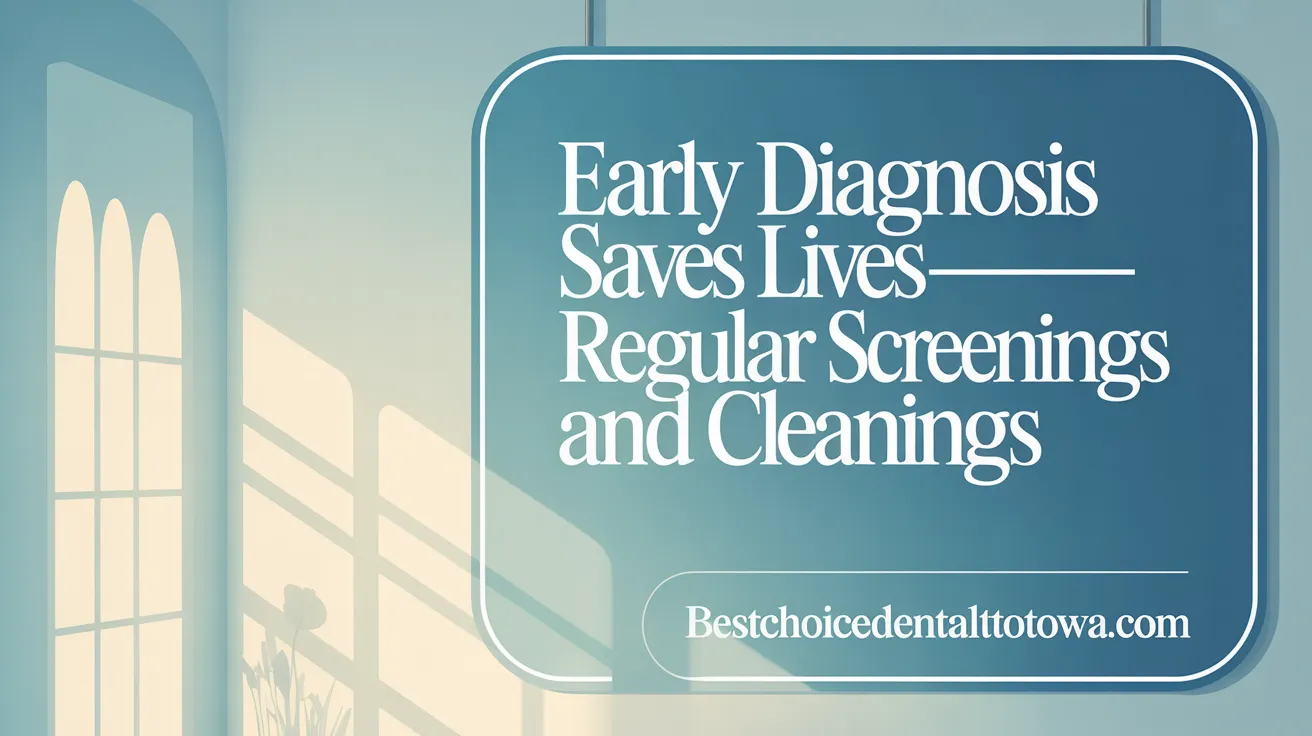
The Benefits of Preventive Dental Care
Preventive dental care plays a vital role in maintaining both oral health and overall health. Regular visits to the dentist help detect problems early, allowing for simpler and more effective treatments. Cleanings, exams, and personalized advice contribute to preserving natural teeth and reducing costly procedures like fillings or root canals (Benefits of Regular Dental Check-ups.
Recognizing Early Signs of Gum Disease and Cavities
Gum disease often begins subtly without obvious symptoms. During dental checkups, professionals can identify early gum inflammation and tooth decay before they escalate. Addressing these issues promptly prevents pain, tooth loss, and systemic complications linked to untreated oral infections (importance of regular dental checkups).
Oral Cancer Screenings Save Lives
Routine dental exams include oral cancer screenings to detect abnormal tissues or lumps. Early diagnosis significantly improves treatment success and survival rates, especially for patients with risk factors such as tobacco use. These screenings are a critical component of comprehensive dental care (Regular dental visits benefits.
The Role of Dental Cleanings and Exams
Dental hygienists perform professional cleaning by removing plaque and hardened tartar that cannot be eliminated by brushing alone (Professional dental cleanings). These cleanings reduce bacterial buildup and inflammation, promoting healthier gums and teeth. Exams by dentists complement this by assessing oral tissues, planning personalized treatments, and monitoring overall oral health (Dental cleaning process).
The Importance of Professional Plaque and Tartar Removal
Plaque and tartar harbor bacteria that lead to cavities and gum disease. Routine cleanings remove this buildup, preventing infection and supporting the immune system. By eliminating harmful microbes, professional cleanings help reduce bad breath and contribute to lowering risks of heart disease and stroke associated with poor oral hygiene (Benefits of Regular Dental Checkups).
Together, these preventive strategies form the foundation for long-term wellness, emphasizing the importance of regular dental visits at least once or twice a year.
The Impact of Oral Health on Systemic Diseases
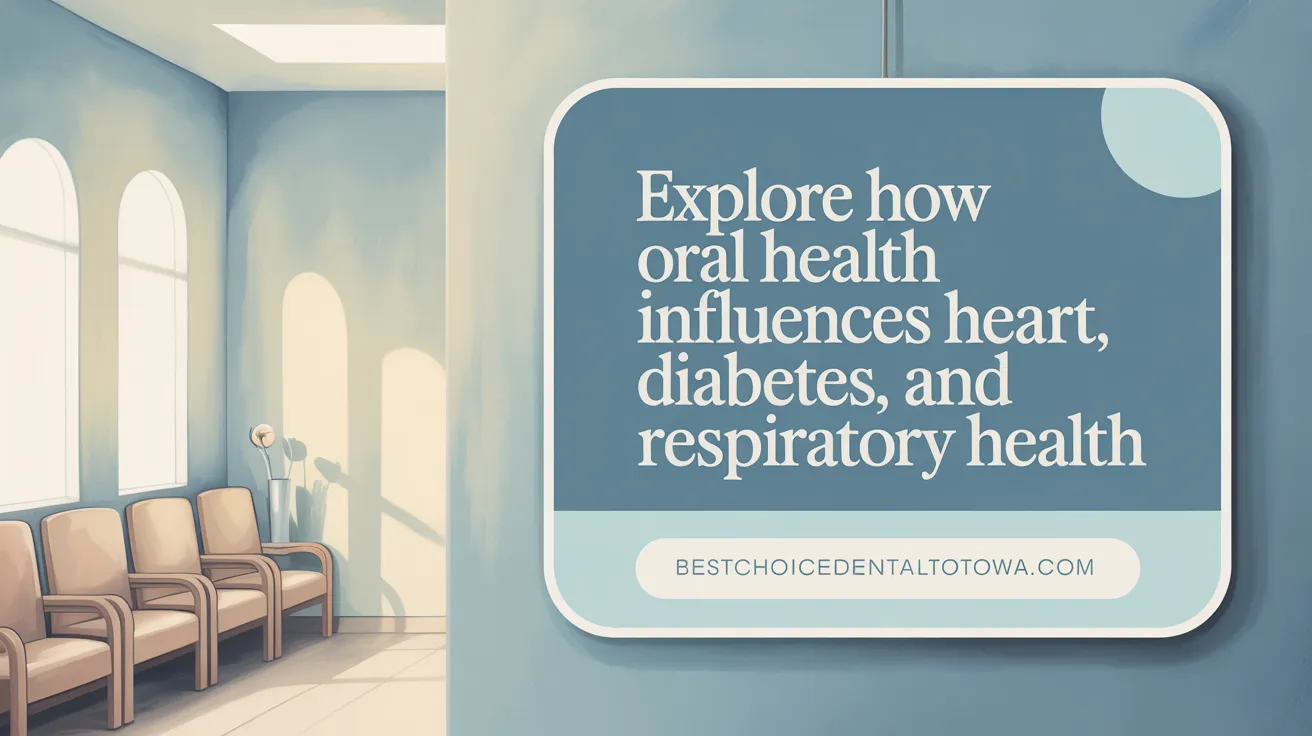
How Does Oral Health Affect Heart Disease?
Poor oral hygiene can lead to gum disease, which studies have shown is linked to heart disease. Harmful germs from inflamed gums can enter the bloodstream, potentially causing inflammation in blood vessels and contributing to clogged arteries or endocarditis, a serious infection of the heart’s inner lining (oral health impact on heart disease, gum disease and systemic diseases, oral health and overall health).
What Is the Relationship Between Diabetes and Gum Disease?
Diabetes and gum disease have a two-way relationship: diabetes increases the risk of developing gum disease, and gum disease can make blood sugar control more difficult. This complicates diabetes management and highlights the importance of maintaining good oral hygiene for overall health (oral health and diabetes, gum disease and health risks, impact of gum disease on systemic diseases).
Can Oral Germs Affect Respiratory Health?
Yes, oral bacteria can be inhaled into the lungs, potentially causing respiratory conditions like pneumonia. Good oral care helps reduce the bacterial load in the mouth, decreasing the risk of such infections, especially in vulnerable individuals (oral health and respiratory diseases, oral health and overall health.
How Are Oral Health Issues Connected to Pregnancy Complications and Cancers?
Gum disease has been linked to pregnancy complications such as premature birth and low birth weight. Additionally, chronic oral infections and inflammation may contribute to the risk of certain cancers, including those of the mouth, gastrointestinal tract, lung, breast, prostate, and uterus (oral health impact on pregnancy, cancers linked to gum disease.
How Do Medications Affect Saliva Flow and Oral Health?
Certain medications, including decongestants and antidepressants, can reduce saliva production. Since saliva helps control oral germs and protect tissues, reduced saliva flow can increase the risk of infections, tooth decay, and gum disease, further impacting overall health (effects of medications on oral health, medications reducing saliva flow.
Maintaining good oral hygiene with regular brushing, flossing, and dental checkups is essential—not only for a healthy mouth but also for preventing systemic health problems linked to oral infections and conditions (good oral care practices, importance of regular dental check-ups, preventive oral care).
Routine Dental Checkups as a Gateway to Overall Wellbeing
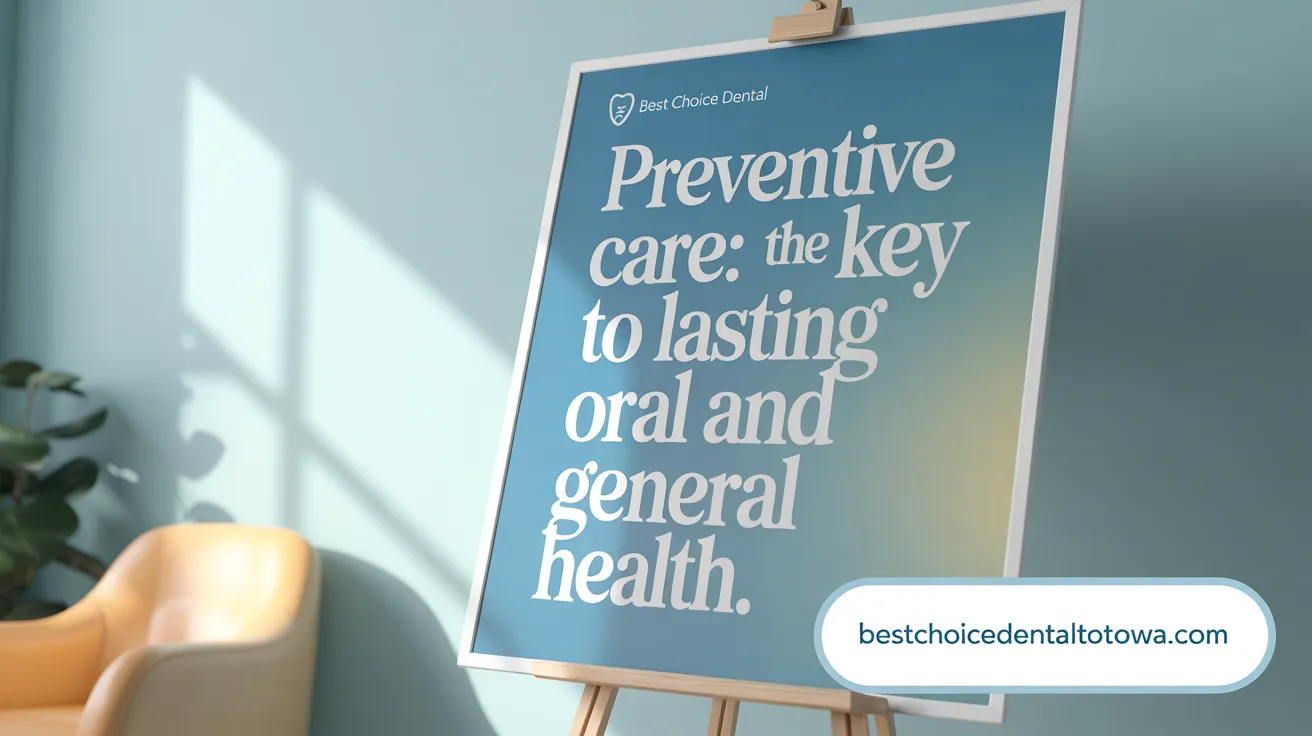
How Often Should You Have a Dental Checkup?
Experts recommend scheduling dental visits every 6 to 12 months, depending on individual health needs. Regular checkups at least once a year are key to identifying and treating early signs of dental problems before they worsen (importance of regular dental check-ups, frequency of dental checkups.
What Happens During a Dental Checkup?
A typical visit includes a professional cleaning by a dental hygienist to remove plaque, tartar, and bacteria that brushing cannot fully eliminate. This process often involves scaling and polishing the teeth (professional dental cleanings, dental cleaning process.
Following cleaning, the dentist conducts a thorough exam to check for cavities, gum disease, dry mouth, and oral cancer. X-rays may be taken to detect issues invisible to the naked eye, such as hidden decay or impacted teeth. Blood pressure and overall health indicators may also be monitored (dental exam by dentist, dental X-rays during checkups.
Financial Advantages of Regular Visits
Most dental insurance plans cover preventive visits fully, making routine checkups cost-effective. For uninsured patients, the cost typically ranges between $80 and $200. Investing in preventive care helps avoid costly and invasive procedures like root canals or extractions later (dental insurance coverage for check-ups, cost of dental checkups without insurance.
Education and Personalized Guidance
Dental checkups are an opportunity to receive tailored oral hygiene advice. Dentists and hygienists guide patients on brushing, flossing, diet, and habits that affect oral health, equipping individuals to maintain a healthy smile at home (oral hygiene advice, brushing and flossing tips.
Beyond Physical Health: Psychological and Social Benefits
Maintaining good oral health enhances confidence and reduces stress related to dental problems and appearance. Regular visits also foster a trusting relationship with your dental care team, ensuring comfort and timely care when needed (benefits of regular dental visits).
By committing to routine dental checkups, you not only protect your teeth and gums but also contribute to your broader wellbeing (oral health and overall health.
Addressing Community Needs and Reducing Oral Health Disparities
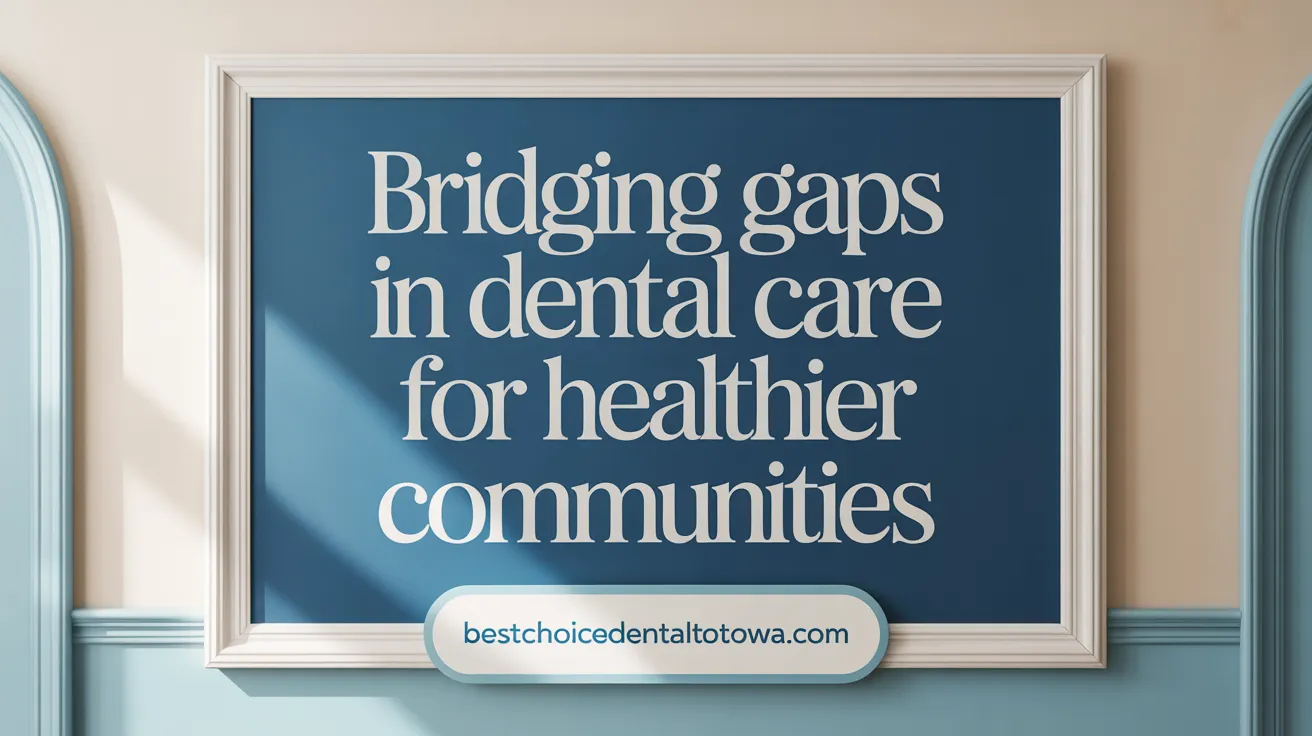
Why is accessibility to dental care important for community health?
Accessibility to dental care plays a crucial role in improving oral health outcomes across communities. It enables early detection and treatment of dental diseases, preventing complications linked to systemic conditions such as diabetes and gum disease and gum disease and systemic diseases. Unfortunately, access is not equal; vulnerable populations often face significant barriers like cost, location, and lack of insurance. These challenges result in poorer oral health and increased emergency dental visits.
How do socioeconomic factors influence dental visits?
Socioeconomic status greatly affects the frequency and quality of dental care. Individuals from lower-income families are less likely to attend regular dental check-ups, often due to financial constraints or lack of coverage. For example, children and adults living below the federal poverty level have the lowest rates of recent dental visits. These disparities lead to higher rates of untreated cavities and periodontal disease in underserved groups, reflecting broader oral health disparities and socioeconomic factors.
What public health measures help improve oral health equity?
Community water fluoridation stands out as an effective public health strategy to reduce dental caries, especially benefiting low-income populations. This measure provides fluoride to all residents regardless of income, strengthening teeth and lowering cavities. Additionally, preventive services like screenings and dental sealants target high-risk groups to curb disease progression.
How do innovative care models such as teledentistry expand access?
Teledentistry and access to care offers remote consultations, education, and follow-up care, breaking down geographic and transportation barriers. This model became particularly valuable during public health emergencies, extending care to underserved and rural populations who might otherwise go without treatment. It enhances timely diagnoses and instructions to maintain oral hygiene standards.
What role do health literacy and policy reform play in reducing disparities?
Improved health literacy empowers individuals to make informed choices about oral health practices, adhere to preventive routines like brushing and flossing, and seek timely professional care. Policy reforms focusing on expanding Medicaid dental benefits and supporting community-based prevention programs have proven effective in enhancing access and reducing health inequities. Integrating dental with primary medical care also promotes comprehensive management of chronic diseases linked with oral health.
| Factor | Impact on Oral Health | Community Benefit |
|---|---|---|
| Accessibility to Care | Early treatment, fewer emergencies | Better overall health and reduced costs |
| Socioeconomic Status | Influences dental visit rates | Identifies vulnerable groups for aid |
| Water Fluoridation | Reduces cavities | Equitable preventive measure |
| Teledentistry | Overcomes geographic barriers | Increased reach and convenience |
| Health Literacy & Policy | Enhances behavioral adherence | Supports systemic reform and access |
Conclusion: Embracing Regular Dental Visits for Lifelong Wellness
The Powerful Impact of Regular Dental Check-ups
Routine dental visits are essential for detecting oral health issues early—such as cavities and gum disease—before they develop into more serious problems. These check-ups not only maintain a healthy smile but also contribute significantly to overall wellness by reducing the risk of systemic conditions like heart disease, diabetes, and respiratory infections.
Encouraging Consistent Dental Care
Maintaining good oral hygiene with daily brushing, flossing, and professional care is a simple, effective way to support lifelong health. Scheduling dental check-ups at least once or twice a year empowers patients to take control of their health and prevent costly, invasive treatments in the future.
Best Choice Dental: A Pillar of Community Wellness
In Totowa, New Jersey, Best Choice Dental stands out by providing comprehensive, personalized dental care to patients of all ages. Their commitment to accessible, preventive dental services helps strengthen the community's health, making quality dental care a cornerstone of overall well-being for families in the area.
